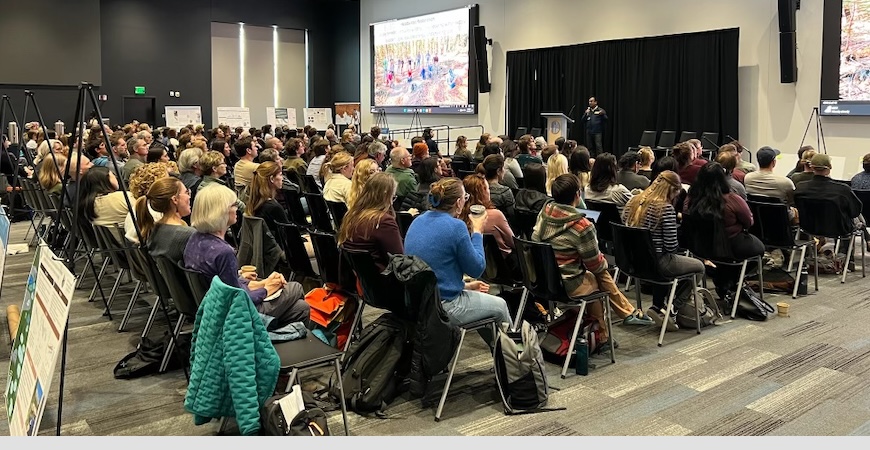
The 2024 Sierra Nevada Science Symposium, hosted March 5-6 at University of California, Merced, brought together National Park Service (NPS), U.S. Geological Survey, National Forest, state, local, and other resource managers and scientists with university researchers and non-governmental organizations to discuss how the latest in science and research, both within and outside protected lands, informs a wide range of complex and challenging Sierra Nevada resource management issues.
The conference was brought to UC Merced this year with the help of Sierra Nevada Research Institute (SNRI) and UC Merced Natural Reserve System Yosemite and Sequoia Field Stations , in coordination with other planning committee representatives from U.S. Geological Survey and three nearby national parks - Yosemite and Sequoia and Kings Canyon. Interest in the event was strong, with registration filling early and over 200 attendees representing 11 state, federal and local agencies, 18 non-governmental organizations, and 27 colleges and universities.
More than 20 SNRI faculty and researchers presented their approaches and findings on a range of important topics, from wildfire resilience, changing uses by park visitors, and climate-smart forest seed sourcing, to restoration and ecosystem services valuation, eco-hydrologically informed carbon sequestration policy, and approaches to increasing a sense of belonging in field-based research. Many of these investigations, as well as others from universities and non-government organizations throughout California and the world, derive critical project support from the UC Merced Yosemite and Sequoia Field Stations.
This year's theme, "Sierra Nevada Past, Present, & Future: Management in Changing Environments," inspired lively discussion about the challenges of adaptive management and restoration in the context of past, present, or future projected climate conditions. More than 100 oral and poster presentations spanned eight sessions encompassing air, soil and water, giant sequoia ecology, park management and indigenous co-stewardship, restoration, forest dynamics and fire, aquatic ecosystems, alpine environments, and biodiversity.
Conference highlights included an inspiring co-stewardship panel with tribal, NPS and university representatives; dialogue on strategies for taking informed management action at the necessary scale and pace to conserve biodiversity and ecosystem function; and discussions about maintaining hope, momentum and public communications in meeting climate-related and other challenges.
Art that integrates science was also on display. Scott Johnston, professor of geology at California Polytechnic State University, San Luis Obispo, juxtaposed his geological research with a textile from artist and longtime Yosemite Leadership Program supporter Ann Johnston. Andie Thrams, Yosemite and Sequoia Field Stations artist-in-residence, displayed her "Forest Prayer Flags" and "HOPE?" projects.
Sponsors of this year's symposium included the Yosemite Conservancy, Sequoia Parks Conservancy and the National Park Service, as well as in-kind contributions from conference co-organizers from UC Merced Natural Reserve System, Sierra Nevada Research Institute, U.S. Geological Survey, and Sequoia and Kings Canyon and Yosemite National Parks.
A full listing of speakers and presentation abstracts is available at the event website: https://snri.ucmerced.edu/events/2024-sierra-nevada-science-symposium .

